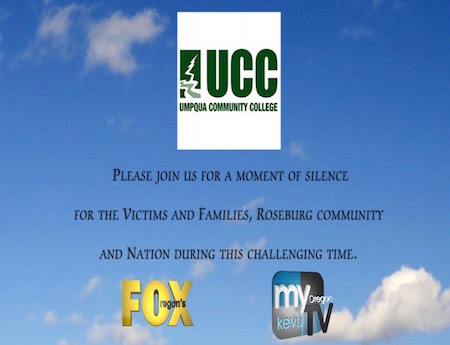How Eugene Stations Covered Thursday’s Tragedy in Roseburg, Oregon

The smarter way to stay on top of broadcasting and cable industry. Sign up below
You are now subscribed
Your newsletter sign-up was successful
When a gunman opened fired in a classroom at Umpqua Community College Thursday in Roseburg, Ore., the television stations from the Eugene market (DMA No. 120) were 50 minutes away. Both KVAL and KEZI, however, had reporters in Roseburg, allowing the stations to start reporting on the tragedy while more staff headed the 72 miles south from Eugene.
KVAL, the Sinclair-owned CBS affiliate, had two reporters in Roseburg in an office of only about eight people, said general manager JR Jackson. The station got first word of the shooting around 10:38 a.m. and was on the air shortly after 11, according to news director Larry Johnson. “We’re very fortunate we have those resources in Roseburg,” Jackson said.
Fifty minutes later, reinforcements had arrived to help produce the wall-to-wall coverage that went on for six straight hours until about 4:30 when the Thursday Night Football telecast started, though the station cut in when necessary.
“We sent pretty much everybody we could,” Jackson said.
Related: Obama Calls on Media to Publicize Comparative Shooting Stats
The station also provides services for the Roberts Media-owned NBC affiliate KMTR. They have different newscasts and anchors, but share reporters, giving them more resources Thursday.
“There was very little information coming out,” Jackson said. “It was a tough day but unbelievable how the team stepped up.”
The smarter way to stay on top of broadcasting and cable industry. Sign up below
KEZI, the Heartland Media-owned ABC affiliate, had just a single reporter at its Roseburg office, but she immediately went to work, sending content back via her TVU backpack. A half dozen reporters and photographers and an engineer arrived on the scene in Roseburg soon after, and eventually the station had a full news team in the building.
“We mobilized instantly,” said general manager Mike Boring.
The news broke just before its regularly-scheduled 11 a.m. newscast, so the station used the broadcast as a jumping off point for coverage that went pretty much straight through until 7 p.m., not even always stopping for commercial breaks, save for the 5:30 national network newscast.
“When something like this happens, we stay calm, balance the emotional story with facts that the public needs to know and deliver it in a way that is helpful to viewers,” Boring said. “We bring excellence everyday and execute as if we were on the national stage every day.”
The station also produced a half-hour newscast at 8 p.m. on its Me-TV subchannel, showing the candlelight vigil, and another 10 p.m. special report on Me-TV before KEZI’s regular 11 p.m. broadcast. It also had live news breaks during the ABC primetime program, using its commercial inventory to update the viewers and Oregon and inform them of the news programming on the digital subchannel.
Sinclair and KVAL produce news for KLSR, the California Oregon Broadcasting-owned Fox affiliate in Eugene, through a news share partnership. The only 7 p.m. newscast in the market, KLSR went live to the sheriff’s office for five minutes around 7:15.
Mark Metzger, the VP and general manager, said they are not running Friday night’s airing of Scream Queens, the Fox horror series that features murders at a college sorority. Never in his 25 years at the station has he preempted network programming like that before.
While national networks and cable channels were trying to get information on Thursday's events, the local stations were happy to help when they could, but their first priority was on their viewers.
During a breaking news story, small market stations may not have 100 producers on scene or dozens of satellite trucks, Boring said, but they do have teams that are family-oriented. People go the extra mile, whether it be the sales people bringing lunch to the newsroom and making phone calls or the morning anchor who was still reporting late in the evening Thursday despite a 5 a.m. broadcast Friday morning.
Small market stations are ingrained in the fabric of their communities, Boring said.
“It’s about knowing the community and the people in it and the right resources so when something like this happens, you have the trust of viewers and the trust of authorities and strong relationships,” he said. “All of that happens long before incidents like this happen, so when a tragedy happens we have all of that built up so we’re able to execute to the very best of our ability for the viewers.”
Added KVAL’s Jackson: “One thing we do not have is a small market attitude here.”
